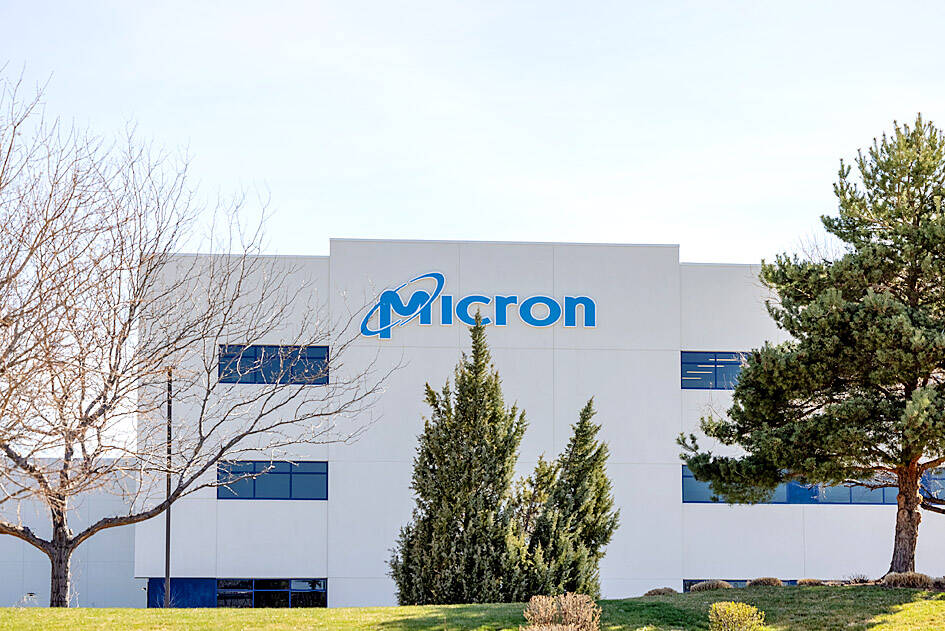Micron Technology Inc on Tuesday announced it would open a semiconductor plant in upstate New York, promising a long-term investment of up to US$100 billion and a plant that could bring 50,000 jobs to the state.
The company was lured to the Syracuse area with help from a generous set of federal, state and local incentives, including up to US$5.5 billion in state tax credits over 20 years.
The announcement comes after US Senate Majority Leader Charles Schumer had pushed for Idaho-based Micron and the company’s CEO, Sanjay Mehrotra, to consider upstate New York for its factory. It also comes months after Congress passed the US$280 billion Creating Helpful Incentives to Produce Semiconductors and Science Act, which set aside US$52 billion to bolster the semiconductor industry.

Photo: Bloomberg
“An investment of this scale in the US is simply not possible without significant government and community support,” Mehrotra said at the announcement.
In addition to tax credits tied to investment and job creation, New York has pledged US$200 million for road and infrastructure improvements where the plant is being built in suburban Clay and US$100 million to a “community benefit” fund. The state would also review supplying the operation with low-cost power.
The federal bill was aimed at bolstering US competitiveness against China and avoiding another chip shortage like the one that derailed the automobile and technology industries during the COVID-19 pandemic.
“Chips are essential to our economy, and if we were to lose the ability to manufacture chips here in the United States, it would be a severe, both economic security and national security risk,” Schumer said in an interview with The Associated Press. “This will be the most advanced memorychip manufacturing facility in the United States and probably the world. And it’s located in a place that will really benefit from it.”
The company plans to invest up to US$100 billion over the next 20-plus years to construct the project, with the first investment of US$20 billion planned by the end of the decade. The deal is also expected to bring more than 9,000 jobs to Micron, and officials believe it could also bring close to 40,000 other ancillary jobs to the region, from suppliers to contractors, officials said.
Micron has several chip manufacturing plants around the world, including in Singapore and Taiwan. The company announced last month that it would invest US$15 billion through the end of the decade on a new semiconductor plant in its hometown, which the chipmaker said would create 17,000 US jobs.
Manish Bhatia, Micron’s executive vice president of global operations, said that New York was selected in large part because it has a history of semiconductor development.
New York is home to 76 semiconductor companies, Schumer said.
“There is an ecosystem of other manufacturers, research institutions,” Bhatia said. “We believe we can funnel a lot of that talent” to the Syracuse area, including military veterans.

The US dollar was trading at NT$29.7 at 10am today on the Taipei Foreign Exchange, as the New Taiwan dollar gained NT$1.364 from the previous close last week. The NT dollar continued to rise today, after surging 3.07 percent on Friday. After opening at NT$30.91, the NT dollar gained more than NT$1 in just 15 minutes, briefly passing the NT$30 mark. Before the US Department of the Treasury's semi-annual currency report came out, expectations that the NT dollar would keep rising were already building. The NT dollar on Friday closed at NT$31.064, up by NT$0.953 — a 3.07 percent single-day gain. Today,

‘SHORT TERM’: The local currency would likely remain strong in the near term, driven by anticipated US trade pressure, capital inflows and expectations of a US Fed rate cut The US dollar is expected to fall below NT$30 in the near term, as traders anticipate increased pressure from Washington for Taiwan to allow the New Taiwan dollar to appreciate, Cathay United Bank (國泰世華銀行) chief economist Lin Chi-chao (林啟超) said. Following a sharp drop in the greenback against the NT dollar on Friday, Lin told the Central News Agency that the local currency is likely to remain strong in the short term, driven in part by market psychology surrounding anticipated US policy pressure. On Friday, the US dollar fell NT$0.953, or 3.07 percent, closing at NT$31.064 — its lowest level since Jan.

The New Taiwan dollar and Taiwanese stocks surged on signs that trade tensions between the world’s top two economies might start easing and as US tech earnings boosted the outlook of the nation’s semiconductor exports. The NT dollar strengthened as much as 3.8 percent versus the US dollar to 30.815, the biggest intraday gain since January 2011, closing at NT$31.064. The benchmark TAIEX jumped 2.73 percent to outperform the region’s equity gauges. Outlook for global trade improved after China said it is assessing possible trade talks with the US, providing a boost for the nation’s currency and shares. As the NT dollar

The Financial Supervisory Commission (FSC) yesterday met with some of the nation’s largest insurance companies as a skyrocketing New Taiwan dollar piles pressure on their hundreds of billions of dollars in US bond investments. The commission has asked some life insurance firms, among the biggest Asian holders of US debt, to discuss how the rapidly strengthening NT dollar has impacted their operations, people familiar with the matter said. The meeting took place as the NT dollar jumped as much as 5 percent yesterday, its biggest intraday gain in more than three decades. The local currency surged as exporters rushed to